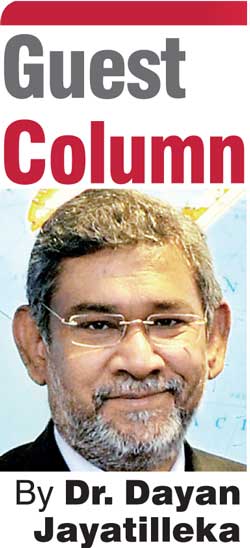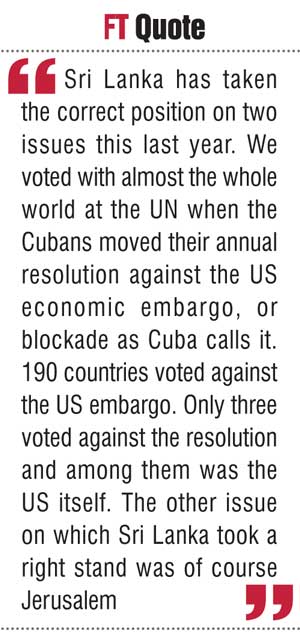Wednesday Feb 18, 2026
Wednesday Feb 18, 2026
Monday, 1 January 2018 00:00 - - {{hitsCtrl.values.hits}}
There were strange reactions to Sri Lanka’s political responses to and UN vote on the issue of Jerusalem. There are those spokespersons of the Sinhala Far Right who criticised the Sri Lankan stand and the cross-party political consensus as instances of double standards. The argument was that those who could not combine to defend Sri Lanka from the charges levelled at it in Geneva, and did not rally round Lord Naseby’s revelations, had banded together on the remote issue of Jerusalem.
These strange reactions to Sri Lanka’s vote on the Jerusalem issue reminds us of the kinds of human beings there are. There are those who recognise the criteria of right and wrong, and those whose notion of right and wrong is based on who is seen to commit it.

There are those of us who criticise the Government and the Sri Lankan foreign ministry because we think they are adopting the wrong stand on this or that issue or on foreign policy issues in general. If and when the Government takes a right stand we are therefore not reluctant to commend it.
Sri Lanka has taken the correct position on two issues this last year. We voted with almost the whole world at the UN when the Cubans moved their annual resolution against the US economic embargo, or blockade as Cuba calls it. 190 countries voted against the US embargo. Only three voted against the resolution and among them was the US itself. The other issue on which Sri Lanka took a right stand was of course Jerusalem.
These two issues were exceptions to the rule of the Sri Lankan Government’s gravely erroneous foreign policy, most especially in Geneva. We must condemn the rule and commend the exception.
What of the argument that the Sri Lankan Government and its foreign ministry failed to stand up for the country and indeed collaborate with the West in the matter of the Geneva resolution, and went on to ignore Lord Naseby’s striving on our behalf, failing to table his findings in Geneva? This is true and we must denounce it. But when a wrongdoer does something right, we must welcome it while condemning his or her wrongdoing.
The fact that on the Cuban resolution against the embargo as well as on Jerusalem, Sri Lanka voted on the other wide of that which the US voted speaks well of the resilient if residual nonaligned heritage of Sri Lanka’s foreign policy and diplomacy. What must be lamented is that the nonaligned position is only fitfully adhered to by Sri Lanka under this government.
Even more insidious is the criticism that the broad civil society and political party platform in Sri Lanka that solidarised with Palestine should somehow be condemned because the same forces did not come together with the same zeal in defence of Sri Lanka.
This is a truly incredible argument. President Mahinda Rajapaksa was for decades, a member and leader of the Committee in Solidarity with Palestine, which brought together diverse political personalities and forces in support of Palestine. These elements often failed to unite on issues pertaining to Sri Lankan affairs and even on external threats to Sri Lanka.

For instance there were those who were for and against the Indo-Sri Lanka accord and the IPKF, who nevertheless united on behalf of Palestine, just as those who stood on different points of the spectrum concerning Sri Lanka’s war with the LTTE, not to mention with the JVP, were active members of the Solidarity Committee with Mahinda.
In fact those who were actually fighting on different sides of the two civil wars, North-east and South, were in sympathy with the cause of the Palestinian people. This was never regarded as anomalous or objectionable, and it would have regarded as eccentric to have done so.
Unifying causes
In our lifetime, there have been at least three issues which united absolutely diverse forces in each country and throughout the world, whatever their stands on political issues within their countries among their countries and pertaining to their countries. These three issues have been the Vietnam War, South African apartheid and the release of Nelson Mandela and the ending of the Occupation of Palestine. Never has anyone anywhere been crass enough to ask why certain forces stood on the right side on these moral issues but on the wrong side of others.
British Conservatives and those of the Labour Left had dramatically opposed views on the campaign against the IRA, the UK war in the Malvinas/Falklands etc., but for the most part with a few aberrations they stood together against apartheid in South Africa and for the release of Mandela. The same was true of the US Congress. Nobody thought it odd or problematic.
Let us grasp the nettle. The Sinhala Far Right is morally blinkered. It does not understand that there are issues that transcend the national, and that one’s country is not always the exclusive or highest value. Our common humanity stands higher than any nation, and common human values stand higher in the human conscience than purely national ones. The real meaning of solidarity is when one solidarizes with another, not necessarily with one’s own.
Just as the Spanish Civil War brought together diverse political and ideological forces the world over against fascism, whatever their other important differences, national political stances and priorities, so too did the causes of Vietnam, South Africa and Palestine in our time. Such causes are transcendent of national causes and priorities. Such transcendent humanistic causes have a higher value than our purely or primarily national concerns. We are humans before we are citizens of a country or members of an ethnic group.
This is not a question of abstract internationalism over concrete if circumscribed nationalism. In our lifetime and perhaps in known history, there has hardly been a more valiant case of a small country defending itself against the world’s mightiest power while positioned on its doorstep, than that of Cuba under the leadership of Fidel Castro. That was not because of his nationalism, but because of his combination of patriotism and internationalism.
Contd. on Page 8